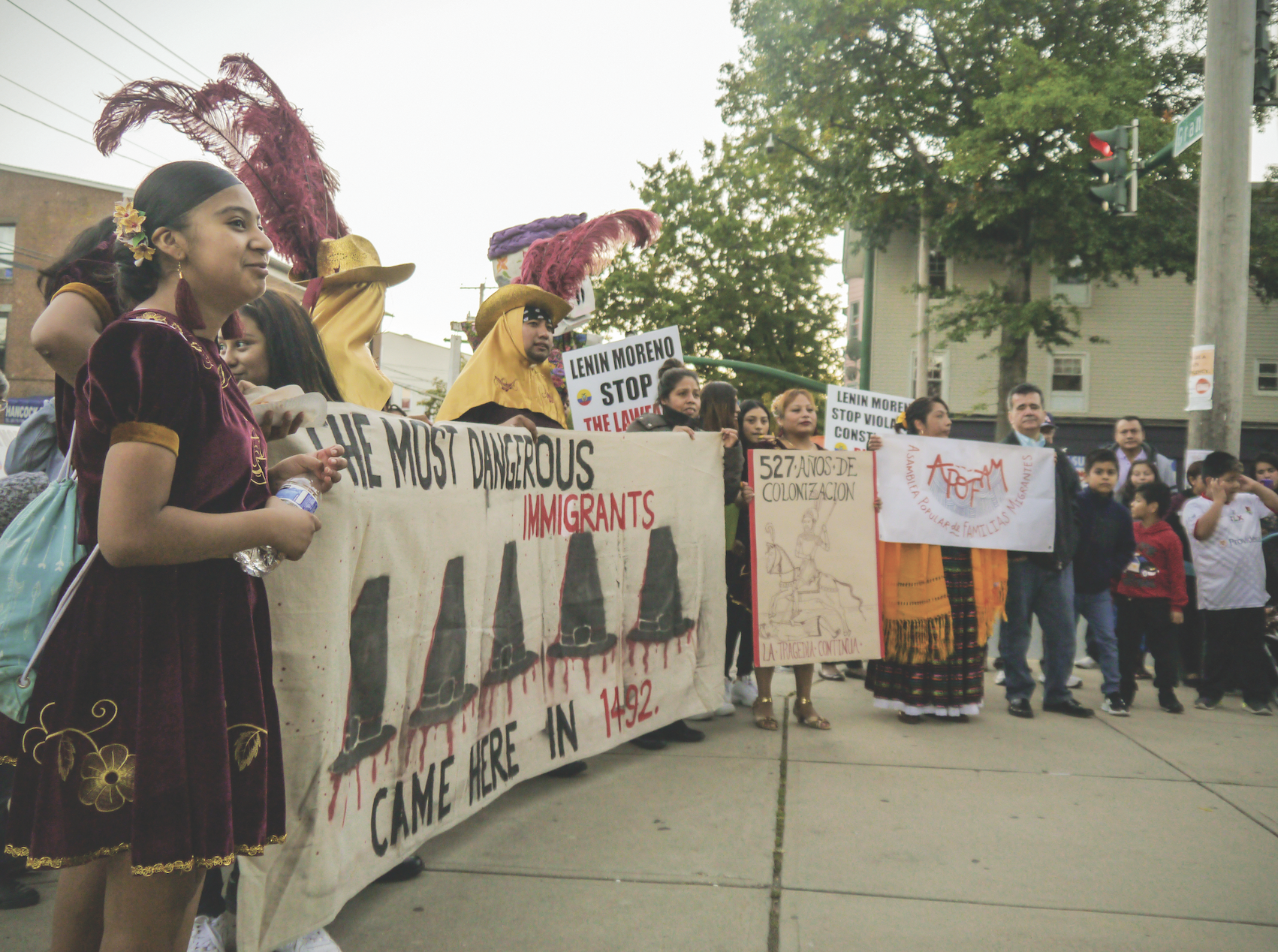
Emiliano Gómez
Years following a heated debate about the legacy of John C. Calhoun and the renaming of a residential college at the University, members of the New Haven community are advocating for a similar demand: change the namesake of Christopher Columbus Family Academy.
Columbus Day, a federal holiday that celebrates Christopher Columbus’ arrival in the Americas, lands on the second Monday of October. On Saturday, the Columbus Day Committee and Knights of Columbus hosted an event celebrating the Italian explorer. At the same time, however, activists from Unidad Latina en Acción, Asamblea Popular de Familias Migrantes and the New York City-based Transnational Villages Network hosted their own festival celebrating indigenous communities and protested the namesake of Christopher Columbus Family Academy, a New Haven Public School.
“It is unacceptable that a school in New Haven is named after the biggest murderer in the world,” Director of Transnational Villages Network Marco Castillo said in a speech before the rally at the Columbus Academy.
The number of cities and states celebrating Indigenous Peoples’ Day, which falls on the same date as Columbus Day, has increased in recent years. Maine and Vermont have passed statewide legislation switching away from Columbus Day. In Wisconsin, a new executive order said that Indigenous People’s Day is to be celebrated simultaneously with Columbus Day. More than 100 localities have made the switch.
Earlier on Saturday, a procession left the historically Italian-American St. Michael Church to the beat of a bagpipe. Participants circled around the statue of Christopher Columbus on the southern edge of Wooster Square to hang wreaths around the statue’s fence.
At the event, two elderly members from the Knights of Columbus — a Catholic charity group based in New Haven — stood next to the Columbus statue dressed as guardsmen in full regalia as local public officials took turns placing wreaths on the fence. Local officials — including New Haven Mayor Toni Harp, West Haven Mayor Nancy Rossi and Congresswoman Rosa DeLauro D-New Haven — attended the ceremony.
For many of those gathered, the wreath laying ceremony was a recognition of tradition and “the immigrant experience,” said Chairwoman of the Greater New Haven Columbus Day Committee Laura Florio Luzzi.
According to Luzzi, Columbus has served as a symbol of belonging to the “American experience” for members of New Haven’s robust Italian-American community. While it’s important to recognize atrocities committed against indigenous populations, a commemoration of Columbus Day can continue alongside it, Luzzi added.
“Whether or not Columbus is viewed as good or bad, it doesn’t change the fact that his actions bridged the gap between the new world and the old,” she told the crowd.
DeLauro, a longtime representative for the Elm City, told the News that she opposes a name change for the Fair Haven school.
“Today we have a serious immigration issue,” DeLauro told the News. “We ought to be more focused on the repression of immigrants [today] than concerning ourselves with trying to denigrate someone else who created an immigrant experience.”
But members of Unidad Latina en Acción, Asamblea Popular de Familias Migrantes and Transnational Villages Network marched for a name change later that afternoon and demanded further recognition of the mass killings prompted by the European settlers. At the event, speakers argued that keeping Christopher Columbus’ name on the school is a disservice to a community with strong roots from indigenous communities and Latin America.
“We’re going to change the name and change the idea that before Europeans there was nothing here,” ULA organizer Erick Sarmiento told marchers in Spanish, which was later translated by the News.
Once in front of the school, Unidad Latina en Acción organizers covered the Christopher Columbus school sign with large parchment paper. Following a speech by Castillo, organizers wrote “Academia Tlahuicole” in red paint to celebrate a Tlaxcaltec warrior hero. Next to the freshly painted name, organizers wrote “Academy of Dignity,” in Spanish.
According to Castillo, many members of New Haven’s Mexican community hails from Tlaxcala — the smallest state in Mexico that is known for its resistance against Spanish invaders. Castillo said the name represents the strength and resilience of the Tlaxcaltec people.
Before leaving the school, protestors gave a platform to speakers of indigenous languages to speak their native tongues and burned incense.
“[European colonizers] took not only our natural resources, but they took our identity, our language too,” New Haven artist Pedro Lopez said in Spanish, as translated by the News.
According to the President of the Board of Education Darnell Goldson, his board makes all decisions regarding the naming of New Haven Public Schools.
“A group, if they want to name or rename a school facility, will need to send a request to the Board of Education,” Goldson told the News in an email. “We will then review the request and go through a public comment process.”
In a June Board of Alders meeting, New Haven Alder Kenneth Reveiz, D-14, proposed recognizing Indigenous People’s Day. After facing pushback from Italian-American groups and the Knights of Columbus, the Alders tabled the proposal.
Columbus Day has been celebrated as a federal holiday since 1934.
Emiliano Tahui Goméz | emiliano.gomez@yale.edu
Nick Tabio | nick.tabio@yale.edu







